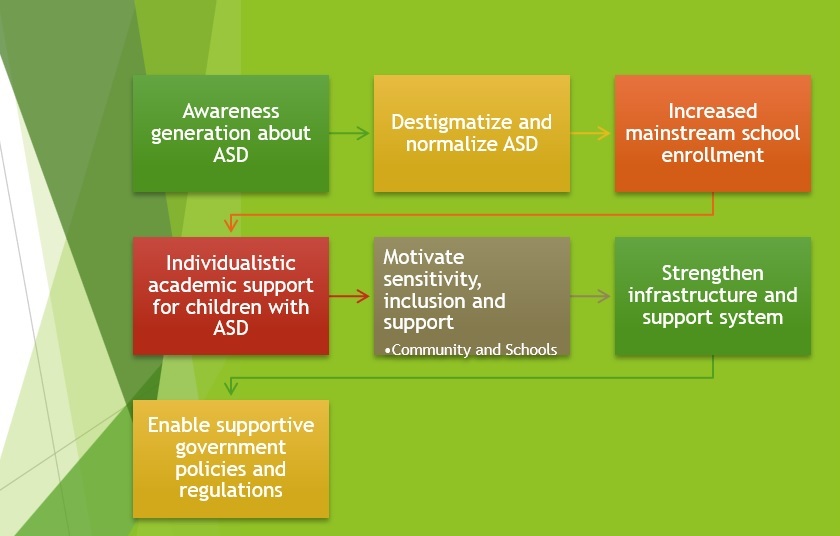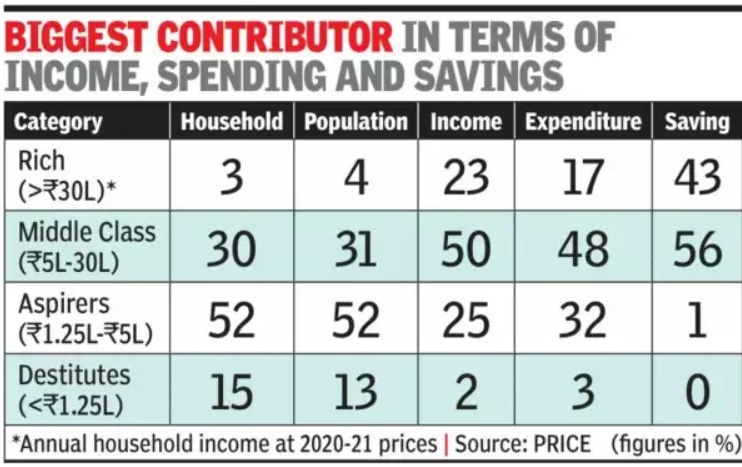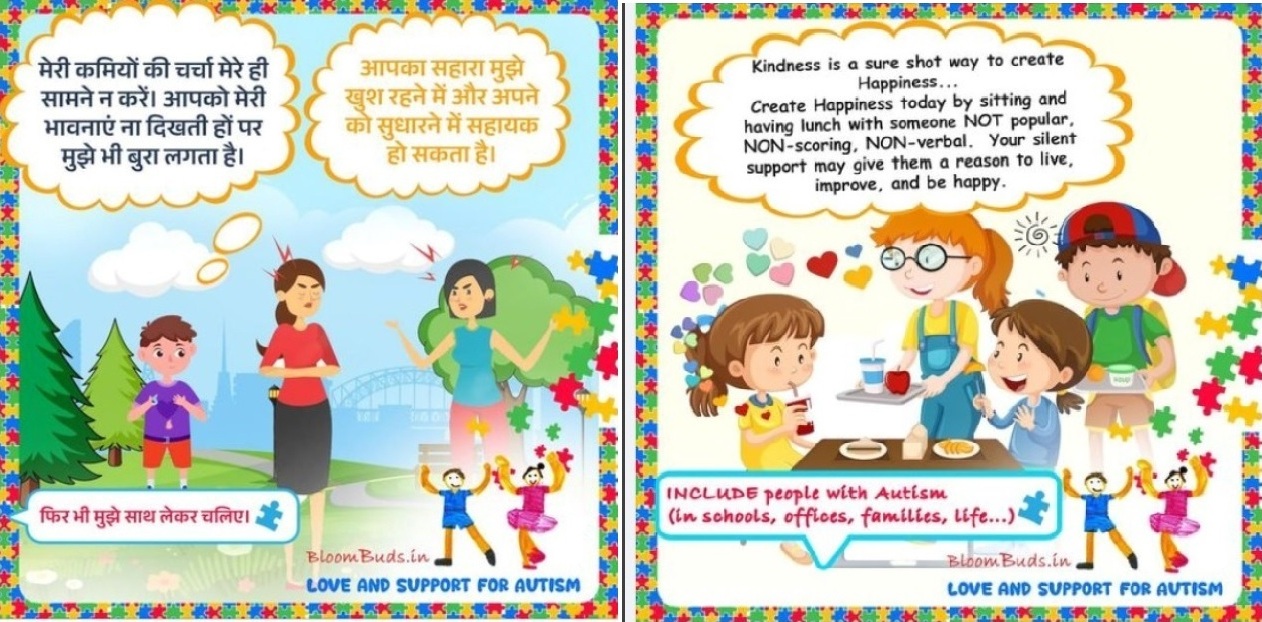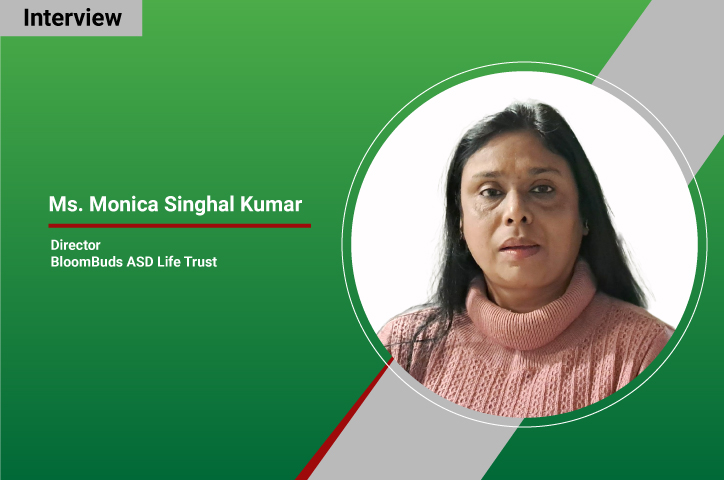Autism Spectrum Disorder (ASD)- a term probably all are familiar with but only a few truly understand the seriousness of challenges for affected individuals and their families. While a lot needs to be done in order to make our society truly inclusive, conducive and supportive of individuals with ASD and their families, there are organisations that have already set upon this path difficult but necessary journey.
One such organisation is BloomBuds, which originated from a poignant encounter with a single mother and her child battling cerebral palsy. Disturbed by the prevailing sense of despair and misinformation surrounding autism, BloomBuds took shape with a mission to provide sustainable solutions for families dealing with ASD.
In this exclusive interview with TheCSRUniverse, Ms. Monica Singhal Kumar, Founder of BloomBuds shares insights into the organization's origins, its transformative journey, and its unique approach to fostering autism awareness and support. They have a multifaceted approach which includes instigating change at the source, engaging with government bodies for policy reforms, educating communities, schools, and law enforcement agencies on handling ASD, and influencing societal perspectives through Behavior Change Communication.
The conversation explores the challenges of early ASD detection; the emotional, economic, and social stress faced by parents; and the organization's initiatives to alleviate these burdens. Kumar discusses the crucial role of economic support and emphasizes the urgency of collective contribution to manage and accommodate the unique challenges presented by ASD, envisioning a future where every human being finds a meaningful place in society.
Scroll down to read the full interview:
Q. Could you share what factors led you to start BloomBuds and how has the organization evolved since its inception?
A. BloomBuds is the result of witnessing autism and the related mental challenges from very close quarters. The crowds of exasperated children with anxious parent(s), mostly mothers, created an environment of despair where people discussed how soon the child would get cured (when no cure exists) and how at least one parent had given up on her ambitions, financial, and social prospects completely.
The day we met a single mother in her twenties, with tangled, mostly grey hair, and a child with cerebral palsy who couldn’t walk without support and was unable to suckle milk from a bottle, was the day we were horror-struck and unable to guide the mother on how to carry on. That’s when BloomBuds started taking shape, aiming to find sustainable solutions for parents and the entire family dealing with ASD. It is the dignity of each human being that BloomBuds intends to achieve.
BloomBuds targets the source of the problem. We approach government bodies for policy changes; we educate the community, schools, and peers about autism; we guide the law enforcement system and service providers on how to handle individuals with ASD (and related disorders). Behavior Change Communication and influencing Policy Regulations are our key strengths so far.
Q. What specific goals or objectives does BloomBuds aim to achieve in the field of autism awareness and support and what makes its approach unique or effective?
A. BloomBuds aims to achieve several specific goals in the field of autism awareness and support:
- To develop awareness in the general masses about a handicap that is invisible on human bodies yet impacts a large populace's economic, social, physical, and psychological lives.
- To influence different sectors, with whom children with Autistic Spectrum Disorder (ASD) and their families interact, to demonstrate sensitivity, adjustment, and support.
- A plea to schools and communities to let children with ASD be 'Included' and 'Adapted' in Mainstream Life.
- To strengthen/develop infrastructure and support systems for the dignified subsistence of people living with ASD.
- To influence government policies and regulations in favor of children, adults, and their families living with ASD.
BloomBuds sets itself apart through a distinctive and impactful approach to autism awareness and support. Our global perspective goes beyond geographical boundaries, sparking conversations that resonate across diverse communities. What truly makes us effective is our dedication to community-driven initiatives, actively involving parents, caregivers, and experts globally. BloomBuds operates from a place of deep empathy, recognizing and addressing the unique challenges faced by individuals and families with Autism. Our collaborative efforts with esteemed experts ensure that our initiatives are not only informed by the latest insights but also contribute to shaping the future landscape of Autism support.
In essence, our approach blends community engagement, and empathy, respite management, long term sustenance model, and infrastructure development, making BloomBuds a catalyst for positive and realistic change.
Q. In your experience, how soon can disorders like ASD be diagnosed, and at what age do most children receive a proper diagnosis? Are there challenges in early detection that you’ve observed?
A. In my experience, Autism Spectrum Disorder (ASD) can be diagnosed as early as age 2, and in some cases, even earlier. However, many children receive a proper diagnosis around ages 4 to 6 when developmental differences become more apparent.
Early detection can be challenging due to the wide variability in symptoms and the fact that some traits may only become noticeable as a child ages. Moreover, there can be disparities in access to diagnostic resources and awareness among healthcare professionals, potentially delaying the identification of ASD in some cases.
The BloomBuds team has come across parents and relatives of children in the age brackets of 6-8 years, sometimes as old as 28 and 30 years, seeking first-time consultations from Delhi hospitals and clinics. Early intervention is crucial for effective support, so efforts to improve awareness and accessibility to early diagnostic tools remain essential in addressing these challenges.
Q. Parents of children with ASD often face social, emotional, and economic stress. From your perspective, what is the toughest challenge they have to cope with, and how does BloomBuds help them address or alleviate these challenges?
A. Parents of children with Autism Spectrum Disorder (ASD) grapple with a complex and layered set of challenges, with the amalgamation of social, emotional, and economic stress creating a profound impact.
Emotionally, these parents often find themselves navigating uncharted territories, trying to understand and address the unique needs and behaviors associated with ASD. The unpredictability of the condition can lead to a sense of isolation and frustration. Adding to the emotional strain are societal misconceptions and judgments, as there is still a lack of widespread understanding about ASD among community members as well as schools. Parents may encounter well-intentioned but uninformed opinions, further intensifying the emotional burden. For example, “Traditional methods like a stick will take care of the tantrums and demands.” Or “If he doesn’t study, isolate him from all the facilities.”
Economically, the costs associated with therapies, specialized education, and support services can be substantial, creating financial stress for families. BloomBuds perceives the economic burden on the families with ASD as the largest challenge to overcome. In India, there is an absence of intervention, subsidies, as well as remedial policies for the middle-class household. The crumbling careers, dreams, and future prospects of lakhs of families are a serious pandemic that is not visible to anyone besides those who are sailing in this rocking boat.
The above trifecta of challenges requires a comprehensive and empathetic support system, acknowledging the intricate interplay of these factors in the lives of parents raising children with ASD.
Q. Economic support is crucial for families dealing with ASD. Where can parents, especially those from low-income families or single mothers, seek financial support? Are there specific programs or initiatives that BloomBuds is involved in?
A. Ensuring economic support for families dealing with Autism Spectrum Disorder (ASD) is paramount, particularly for those facing financial constraints, such as low-income families or single mothers. Recognizing the intricate challenges, they encounter; various initiatives can provide financial assistance and resources. BloomBuds, in alignment with its comprehensive approach, is actively involved in several programs aimed at supporting families dealing with ASD.
A few projects that are in pipeline are:
- Inclusion of ASD in mainstream health insurance
- ASD appropriate school curriculum; with full range of facilities and teaching resources; life skill training for survival and sustenance; ASD therapy support and periodic assessments.
- Additional centres (again under PPP model) for training of Special Educators, Counsellors/Psychologists, Speech Therapists, Occupational Therapists.
- Full day cum residential school/s for children on spectrum unable to integrate in the family setup
- Skill Development and Vocational Training for ASD; spectrum and talent appropriate
- Infrastructure Development: Respite Centres; Post School Centres, and Permanent Specialist ASD Family Residential Townships (PSAFRT)
- Regulated therapies and umbrella pricing: standard subsidized services
- Subsistence opportunities including job quotas and ASD pension
- Public Policy and Integration Research especially
- Helpline/Call Centre
- ASD family support groups
- IEC drive around the country including Public Interest Advertising (PIAs)
BloomBuds’ involvement in these diverse initiatives reflects a commitment to addressing the economic challenges faced by families dealing with ASD. Through these programs, the organization strives to create a more supportive and inclusive environment, recognizing the importance of financial assistance in the holistic well-being of individuals with ASD and their families.
Q. How can schools be more accommodating and supportive of children with ASD? Are there specific strategies or programs that you recommend for creating an inclusive educational environment?
 A. CBSE and the Department of Education have already introduced several beneficial and very practical regulations for children with learning disabilities. The schools need to implement them sincerely, and a governing body is required to oversee that the rights and benefits allocated by the government are being delivered to the beneficiaries. BloomBuds aims to be that governing body.
A. CBSE and the Department of Education have already introduced several beneficial and very practical regulations for children with learning disabilities. The schools need to implement them sincerely, and a governing body is required to oversee that the rights and benefits allocated by the government are being delivered to the beneficiaries. BloomBuds aims to be that governing body.
We've shared a few areas where schools can work to improve inclusivity and support for children on the Autism Spectrum Disorder (Figure 1).
Q. Are there any government initiatives in place to support such children and their families? Based on your experience, what recommendations would you provide to design, improve or expand such initiatives?
A. Let’s consider a few scenarios:
1. The overall National Trust Act’s budget allocation in FY 2023-24 is Rs. 68,804.85 Cr, out of which Scheme Allocation is Rs. 54,374.48 Cr and Non- Scheme allocation is Rs. 14,430.37 Cr. The facilities and the infrastructure provided under these schemes seem more suitable to Lower-Income-Group families.
Of the 15.73 million Indian population that is living with ASD (and related disorders), 4.72 million people (30%) belonging to the Middle-Income-Group are most vulnerable and don’t receive medical benefits in line with their living standards. This population is well- informed, evolved, thrives on their children’s education and progress, yet their hard-earned savings get completely wiped out in running from private hospitals to therapy centers. Depression, parental suicides, and marital discord/divorces due to the financial and social stress (because of the ASD) are only seen in Middle-Income-Group families.
 Given the situation, we at BloomBuds ASD Life Trust have requested the National Trust for:
Given the situation, we at BloomBuds ASD Life Trust have requested the National Trust for:
- An increase in the budget and appropriate allocation suiting the requirements of Middle-Income-Group population of the country.
- Many more centres like NIPCIID so that the therapies and care services become quick, affordable, and efficient. We truly aspire to see NIPCIID in every district of the country.
- Easy access to government facilities for testing, certification, therapies, and utilization of the schemes.
- Inclusion in the mainstream medical insurance schemes across the board.
2. By Government’s regulations, the Autistic candidates are permitted to use the services of a scribe or an adult prompter, are given extra time to complete their exams, have options of dropping some subjects in place of certain (so called) easier ones. Overall, the schools are better sensitized.
Yet, it is not enough! BloomBuds is working on:
- Training scribe to be better prompters.
- Redesigning and modifying the subjects and curriculum for a more practical adaptation.
- Sensitizing teachers, students, staff, and the parents of neurotypical children to extend better support.
Similarly, there are many areas where BloomBuds is dedicated to bring about concreteand visible changes.
Q. In your opinion, what role does public awareness play in breaking down barriers and promoting social inclusion for individuals with ASD, and how can media outlets actively contribute to this cause?
A. Public awareness serves as a linchpin in dismantling barriers and fostering social inclusion for individuals with Autism Spectrum Disorder (ASD). It acts as a catalyst for dispelling myths, reducing stigma, and promoting a more inclusive society. When the public is well-informed about ASD, there is a greater likelihood of creating environments that are understanding and accommodating. Public awareness is the bridge that connects individuals with ASD to societal acceptance and support.
Media outlets, being powerful influencers, play a vital role in this process. Through responsible reporting and storytelling, they can shape public perceptions, highlighting the diverse experiences and capabilities of individuals with ASD. Feature articles, interviews, and documentaries can contribute to a more nuanced understanding. Social media platforms offer a dynamic space for initiating conversations and spreading awareness. By actively engaging with advocacy initiatives and dedicating airtime or column space to ASD-related topics, media outlets become instrumental partners in breaking down barriers and fostering a culture of inclusion. Most importantly, media can establish pressure on the government to act and expedite the initiatives that are in pipeline.
Media can help BloomBuds in taking our unique (never done before in the history of autism) awareness creatives to public by printing the same in most prominent national dailies, in a spot that is inadvertently seen by all readers.

Q. How do you envision the future of BloomBuds? Are there any upcoming projects or initiatives that the organization is looking forward to?
A. Envisioning the future of BloomBuds is rooted in our steadfast commitment to champion inclusion and support for families affected by Autism Spectrum Disorder (ASD). As we propel our mission to ignite a global conversation about autism, transcending borders and stereotypes, the organization foresees a future marked by impactful initiatives and collaborative projects.
In the upcoming journey, BloomBuds aims to spearhead projects that amplify awareness and understanding of ASD. Through innovative campaigns, educational endeavours, and community-driven initiatives, we aspire to break down barriers obstructing the education, employment, and social integration of individuals touched by Autism.
BloomBuds is collaborating with law enforcement to train police force, tweak Juvenile Justice Act and POCSO for their better understanding of Autism and to sensitize the force towards the limitations and personalities of the individuals with ASD to ensure fair and just treatment within the criminal justice system.
Q. Finally, what message or call to action would you like to convey to the readers regarding BloomBuds and the broader issue of autism awareness and support?
A. In closing, we extend an earnest call to action to our readers, urging you to join us in a world of love and support for individuals touched by Autism Spectrum Disorder (ASD). BloomBuds is a collective movement dedicated to breaking down barriers and nurturing futures.
Autism is likely to break apart the social fabric of society if not checked and contributed by all. While communities need to be supportive and accommodating, we also make an earnest plea to the governments, corporates, and individuals to generously contribute financially to this cause.
Autism needs a lifetime management. This is an incurable disorder. With 15.6 million individuals suffering from ASD in India, every 1 child in 89 diagnosed with Autism, it is the responsibility of the entire society to come forth and contribute in whatever form they can.
People with ASD andrelated disorders suffer from anxiety, impulsivity, and learning disorders. Such manifestations can render these individuals as victims as well as perpetrators in a social disorder or a crime. If not nipped at the earliest, the social situation can get disruptive for everyone.
As we embark on this transformative voyage, we invite individuals, communities, and partners to join us in accommodating the individuals with ASD in a dignified way. Let’s build homes (after their parents are no more), educational institutes, families, medical infrastructure, and justice system for them. Together, we envision a future where every ‘BloomBuds’ finds a meaningful place in society.





 A. CBSE and the Department of Education have already introduced several beneficial and very practical regulations for children with learning disabilities. The schools need to implement them sincerely, and a governing body is required to oversee that the rights and benefits allocated by the government are being delivered to the beneficiaries. BloomBuds aims to be that governing body.
A. CBSE and the Department of Education have already introduced several beneficial and very practical regulations for children with learning disabilities. The schools need to implement them sincerely, and a governing body is required to oversee that the rights and benefits allocated by the government are being delivered to the beneficiaries. BloomBuds aims to be that governing body. Given the situation, we at BloomBuds ASD Life Trust have requested the National Trust for:
Given the situation, we at BloomBuds ASD Life Trust have requested the National Trust for:













.jpg)



